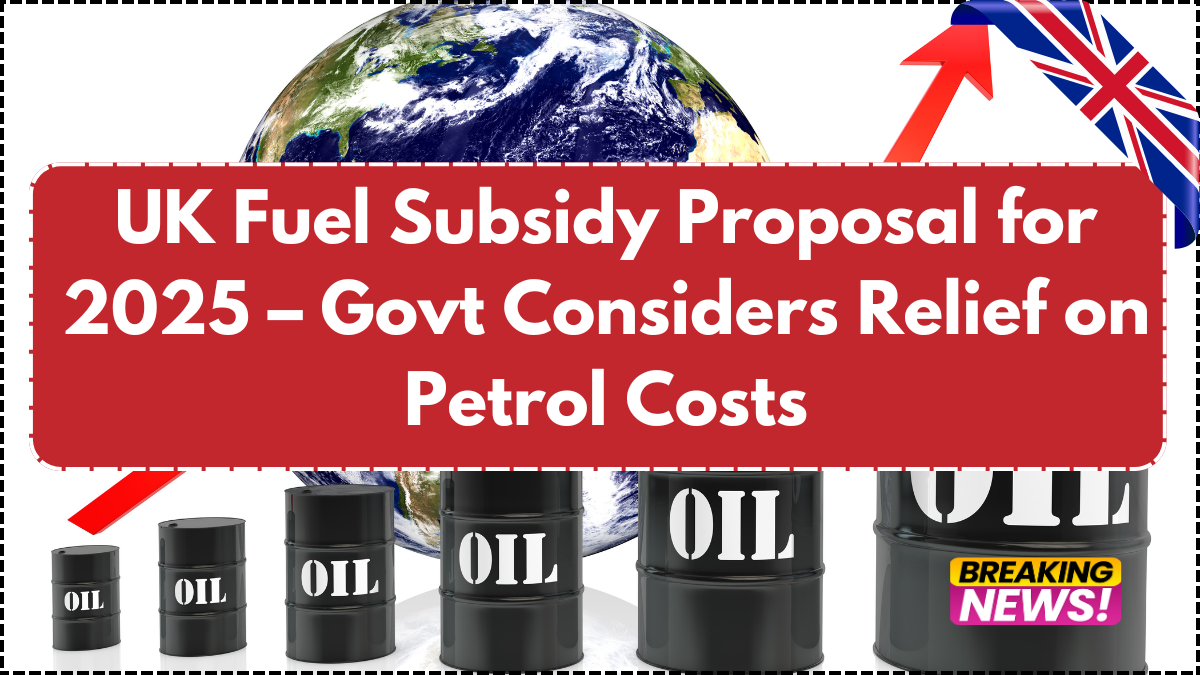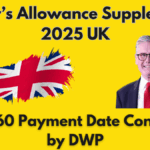In July 2025, the UK government is actively evaluating a new fuel subsidy scheme in response to rising public pressure over escalating petrol prices and the overall cost of living. With household budgets under strain and inflation biting into essential expenses, ministers are considering targeted measures to alleviate transportation costs for consumers and businesses alike.
The proposed UK Fuel Subsidy Proposal 2025 would aim to cushion the impact of fuel expenses by either reducing fuel duty or providing direct subsidies at the pump. Discussions within Whitehall suggest that the Treasury is analyzing several financial models, some of which may involve temporary reductions funded through windfall taxes on energy firms.

Table of Contents
Why Petrol Prices Remain a Flashpoint in 2025
Petrol prices in the UK have surged by over 12% in the past six months, primarily driven by global supply disruptions and a weaker pound. The cost of importing crude oil remains volatile, pushing forecourt rates beyond what many drivers can sustainably manage. This situation is exacerbating the cost of living crisis, particularly for lower-income households and rural communities where car travel is non-negotiable.
Transport remains one of the top three expenses for UK families. For many, cutting back on fuel use isn’t an option—commuting, school runs, and supply chain logistics all rely on accessible and affordable fuel. In this climate, the UK Fuel Subsidy Proposal 2025 could play a critical role in preventing further economic hardship.
Key Features of the Subsidy Options Being Considered
While no final plan has been approved yet, several outlines have surfaced:
Option |
Description |
Potential Impact |
|---|---|---|
Fuel Duty Cut |
Temporary reduction in per-litre fuel tax |
Lower pump prices; immediate relief |
Direct Subsidy |
Government covers a portion of fuel costs at the pump |
Easier implementation for drivers; complex logistics for vendors |
Targeted Vouchers |
Discounts for low-income households or key sectors (e.g., transport) |
More equitable support; administrative challenges |
Corporate Tax Offset |
Subsidy funded by increased tax on oil companies |
Politically popular; risks industry pushback |
Each scenario carries trade-offs, balancing public relief against fiscal responsibility. Treasury officials remain cautious, emphasizing the need to avoid long-term budget deficits while still offering meaningful assistance.
Public Sentiment and Political Pressure
The current administration is under significant scrutiny, with opposition leaders and advocacy groups pressing for swift action. A recent YouGov survey found that 68% of UK residents support some form of government intervention on fuel prices. With a general election expected in mid-2026, policymakers are keenly aware that inaction could cost them politically.
Moreover, trade associations representing delivery firms, taxi unions, and agricultural transport providers have all voiced support for the UK Fuel Subsidy Proposal 2025. These groups argue that unchecked fuel costs could disrupt supply chains and inflate prices across essential goods.
Long-Term Considerations and Energy Policy Implications
Critics of the proposal warn that subsidizing petrol may conflict with the UK’s broader climate goals. Environmental think tanks suggest that relief should be paired with incentives for electric vehicles (EVs) and public transport investment. There’s also concern that temporary subsidies might delay the adoption of cleaner alternatives.
Nonetheless, government sources indicate that any fuel relief package would be part of a larger transitional policy aimed at stabilizing the economy while continuing to invest in sustainable transport infrastructure.
Conclusion: A Balancing Act Between Relief and Reform
The UK Fuel Subsidy Proposal 2025 stands at a crossroads of economic urgency and long-term planning. As of July 2025, it is evident that a well-crafted relief measure could ease the immediate burden of petrol prices and soften the blow of rising living costs. However, execution will be key—balancing short-term help with strategic foresight will define the proposal’s success.
FAQ
What is the UK Fuel Subsidy Proposal 2025?
The UK Fuel Subsidy Proposal 2025 is a government plan under consideration to reduce the cost of petrol for consumers, potentially through tax cuts, subsidies, or discount schemes.
Why are petrol prices so high in July 2025?
Petrol prices have climbed due to global oil supply issues and a weakening British pound, increasing the cost of importing fuel.
Who will benefit from the proposed fuel subsidy?
Potential beneficiaries include motorists, transport companies, and low-income households, depending on the final structure of the subsidy.
Will this proposal impact the UK’s climate commitments?
It might, if not carefully aligned with green policies. The government may include parallel support for EVs and public transport to offset any negative environmental impact.
When will a final decision be made?
A formal announcement is expected later this summer, as ministers finalize the fiscal analysis and gather public input.
Click here to learn more





